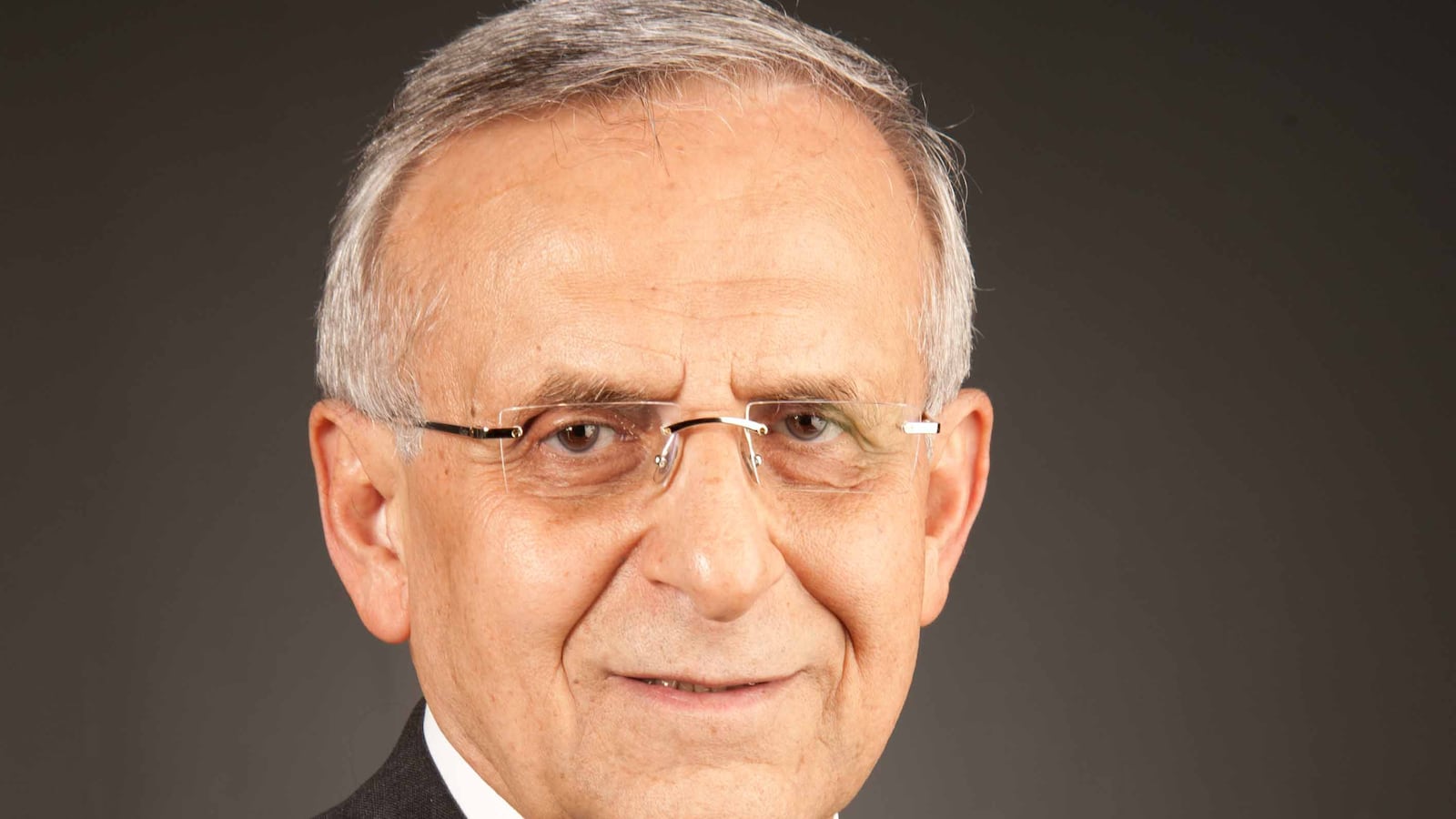As Iran gears up for elections in June, the fanfare of vetting a presidential-candidate list is once again in full swing. While the president is subordinate to the country’s real leader, the Ayatollah Khamenei (a man never up for election himself), the position nevertheless attracts many contenders. And with current officeholder Mahmoud Ahmadinejad terming out this year, one man has already thrown his hat into the ring to be the next president of the Islamic Republic: Hooshang Amirahmadi, a professor at New Jersey’s Rutgers University—a man who hasn’t lived in Iran for nearly 40 years.

Amirahmadi is a well-known player in the stateside machinations toward power of the Iranian expat community—he heads the American Iranian Council (AIC), which focuses on public policy and U.S.-Iran relations and which he credits for former secretary of State Madeleine Albright’s apology to the people of Iran for America’s role in the 1953 coup that removed democratically elected Prime Minister Mohammad Mossadegh.
Born in the Caspian province of Gilan, Amirahmadi moved to the United States before the revolution in 1975, to pursue a master’s degree in industrial management at the University of Dallas. He later received a Ph.D. in planning and international management from Cornell and entered American academia. At the helm of the AIC, he’s one of a number of Iranian-Americans in influential positions at think tanks, not-for-profits, and even human-rights organizations in New York and D.C. who are quietly biding their time and keeping their contact books fresh in hopes of one day returning to Iran in a position of power.
Amirahmadi just happens to be more transparent about his intentions: he’s tired of being a behind-the-scenes guy in Iranian politics—he wants the front-row spot. His campaign website is in English and Farsi—so that he can reach the 5 million to 7 million Iranians in the diaspora, he tells me. There, his electoral promises include the intention to resolve the political infighting currently plaguing Iran’s government—which he tells me can only be done by an “outsider” such as himself; improving U.S.-Iran relations; and fixing Iran’s economic crisis (brought on, in part, by American and EU sanctions).
Of those policy points, Amirahmadi seems most focused on U.S.-Iran relations, in keeping with the mission of the AIC. He calls the issue “interconnected” to every domestic problem in Iran. Having been an unofficial intermediary between the two countries, he has gotten to know some of the key players in the diplomatic community and their respective needs, including people at the State Department and people in the upper ranks of Iranian government. The U.S., Amirahmadi says, is looking for “the right person” in Iran—and that person “could be left wing, moderate, conservative.” Regardless, “they want someone in Iran that will not be against their interests in Iran, in the region, and beyond,” who will help with “some openings for economic trade and political relations.”
He seems to believe the Iranian people want those things in a president too.
The professor, who says that he has met privately with Ahmadinejad, says that while the Supreme Leader has been opposed to negotiations with the U.S., Ahmadinejad was “interested in negotiation,” but “made a grave mistake going after Israel and the Holocaust”—and that the president “knows that well.”
Amirahmadi says he brought the Israel issue up with the president during their meetings—and that Ahmadinejad privately backtracked on his comments about Israel. “In the very beginning, he would say, ‘I said what I said’—but later on, he began changing his mind,” the professor says. According to Amirahmadi, the president “basically said, ‘I mean the [Israeli] regime as opposed to the country has to be wiped out, meaning a particular government, like [Benjamin] Netanyahu ... I did not mean the Holocaust didn’t exist, but I said that I was questioning the number and also posing a question to the international community about why we can’t look into it and see what really happened.’”
For all his access to Iran’s president, though, Amirahmadi seemed somewhat unfamiliar or uninterested in exactly how much freedom the president actually has (or rather, does not have). Earlier this month, he spent five hours in a Reddit.com Ask Me Anything forum, answering questions from an audience that was primarily non-Iranian, judging by the comments. His answers often ascribed a level of power to the president that doesn’t exist inside Iran—such as his promise that if elected, “all citizens will have equal rights regardless of their religion,” and that “in my administration there will be no restriction on any type of media.” These are serious matters that address the fundamental identity of the Islamic Republic and would therefore only be addressed by the Supreme Leader.
Yet when I asked him what he would do about removing the mandatory hijab—the single most visible issue when it comes to the equal rights he says he supports in Iran—he told me "I don't want to promise anybody anything wrong or false."
"Chador is Islamic law," he incorrectly tells me—veiling is not mandatory in the Koran itself and is not universally accepted as mandated in the Hadiths—and as someone who is “not in opposition to the regime” and who is “running within that framework, there are things that I cannot change.” It's all something of a contradiction considering the promises he made on Reddit with regard to other issues within the Islamic Republic’s “framework.”
When I tell him that there are other Islamic countries—most in fact—where hijab is not mandatory, he says, “Everybody has to cooperate here,” and states that “unfortunately, Iran is a society of extremes.” He is critical as he mentions that under the shah, “women would go with a little short[s] in the middle of Tehran,” then laments the other end of the spectrum, where Iranian women are forced to wear hijab.
And for all his posturing that “I know Iran ... I know what Iran is all about,” he doesn’t seem to know or perhaps understand Iranians in Iran—and how much they have changed in the decades since he lived there. With high levels of co-habitation among unmarried couples, the private parties that put Hollywood to shame, and the Internet’s profound connection to the rest of the world, today’s Iranian is, on average, someone considerably younger than Amirahmadi who regardless of religious beliefs is in many ways living a more “Western” lifestyle—shorts and all—than his or her parents did before the revolution.
Yet Amirahmadi doesn’t see his decades of absence from his home country as an issue in his election campaign. “People who have lived in the Islamic Republic are not even as qualified as I am,” he says. He then cites his academic expertise—he’s the former director of the Center for Middle Eastern Studies at Rutgers—and his “shuttle diplomacy” with organizations like the AIC as evidence of his ability to be a “peacemaker [and] a bridge builder.” In his view, Iranians abroad “have lived in the world” and gained a perspective that citizens isolated in the Islamic Republic do not have. “I understand Iran,” he says. “I’m one of the best Iran experts you can get.”“I’m not like your average expatriate who stays here or goes every so often to Iran for a visit and sightseeing and then returns,” he adds. “I have been actively involved in Iran’s life throughout all this time.”
Amirahmadi cites Egypt’s president, Mohamed Morsi, and Ayatollah Khomeini as two individuals who lived abroad before returning home to rule. Neither, however, was abroad for nearly four decades—Morsi lived in the United States for six years, studying and then briefly teaching in the California university system before moving back in 1985 to rise through the ranks of government. Khomeini was into forced exile by the shah for nearly 15 years and returned immediately upon the shah’s departure. The professor’s examples are troubling, in any case, considering the types of rule these two leaders in particular imposed upon their countries.
If elected, Amirahmadi says, his main international priority—apart from not antagonizing Israel—would be to divert Iran from nuclear technology toward what he calls “cybertechnologies.”
“In 10 years cybertechnology will be developed to the extent that you could, in the U.S., destroy the Russian bombs as they sit in Siberia, without shedding any bombs, just by cyber,” he says, before adding that he would develop the technology “for peaceful purposes.”
Amirahmadi says he would also work to “get the sanctions out” so Iran could open up to foreign investment. That’s tied to his domestic plan to “increase oil revenue and diversify foreign-exchange earnings,” particularly through agriculture and industry. He adds that he would work toward promoting small businesses, especially real estate and construction. “I will expand economic activities significantly,” he says, and promises to create 6 million jobs in the first four years of governing—“that’s my target.”
Easier said than done? Perhaps, but that’s not unlike his candidacy itself. The vetted candidates will be announced in May. Until then, expect to hear more from Amirahmadi—that’s one promise he can definitely keep.





